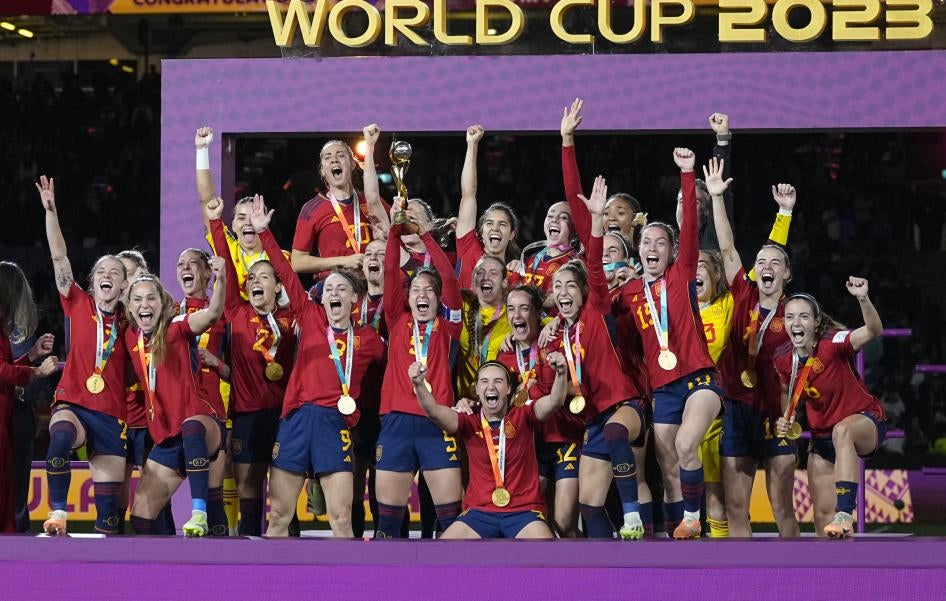The Spanish women’s national soccer team ultimately won twice—on the pitch as champions of the recent Women’s World Cup—and then with the removal this month of Royal Spanish Football Federation president Luis Rubiales.
The overdue ouster came after Rubiales tried desperately to hold onto his position after he full-body hugged team members and forcibly kissed champion player Jennifer Hermoso after the winning game.
Even when pressure to step down finally came, Rubiales refused. He went on the offensive, claiming the kiss was consensual, which Hermoso denied. At a news conference, he shouted five times “I will not resign!”—giving a glimpse into the persistent culture of sexism in the Spanish soccer system. Spain is not alone: In many other national federations, women players have an uphill battle fighting harassment and sexual assault as well as other abuses including corruption, wage theft, and threats and retaliation.
Hermoso put it best when she said: “I am sure that as the World Champions, we as a team do not deserve such a manipulative, hostile, and controlling culture. These types of incidents add to a long list of situations that the players have been denouncing in recent years.”
Yet Rubiales was able to hold onto his position for weeks because soccer’s governing body, the Fédération Internationale de Football Association (FIFA), has poor governance to remove abusive leaders, and few systems to support women players facing sexual abuse, threats and intimidation.
At the time of his offenses at the award ceremony, Sydney Olympic Park echoed with boos from almost 80,000 fans. Many of us there in person were perplexed at why FIFA officials present took no action against apparent sexual harassment on the stadium video and soccer’s biggest global stage. As gold confetti blanketed the stadium, no one in power did anything to stop the Spanish federation president. No one on stage tapped Rubiales on the shoulder to say, “Please stop inappropriately touching the champions.”
Unfortunately, that’s consistent with FIFA’s failures to remove abusers in power elsewhere, given the sexual abuse complaints in 20 of FIFA’s 211 national federations.
This week—three weeks after the Women’s World Cup final—Rubiales finally resigned.
Women soccer players worldwide should be free of violence and harassment anywhere relating to or arising out of their work, including at the stadium, the training center, the national federation, and work-related accommodation and work social events.
The difficulty of dislodging Rubiales and the head coach Jorge Vilda, also accused of harassment and controlling behavior, show how far FIFA, UEFA (where Rubiales was until this week vice president) and global sports bodies have to go to prove that they take an end to abuse of women players seriously.
In 2022, the Spanish women players revolted against the coach and federation, with many sounding the alarm by boycotting the national team. But their complaints were ignored. In the run-up to the Women’s World Cup, 15 of Spain’s top women players risked their careers to call out abuse in the federation such as Vilda’s requirement that players sleep with their hotel room doors unlocked, ostensibly to provide team staff access—but a clear risk to players’ safety from sexual abuse.
Rubiales’ non-consensual kiss came minutes after he was filmed grabbing his crotch in the stands, apparently gesticulating to “celebrate” the Spanish women players’ victory.
For the past three weeks, Rubiales and the Royal Spanish Football Federation used their enormous power to threaten and retaliate against the women players who brought them national victory. Hermoso was targeted by her own employer, threatened with legal action, and said she was “under continuous pressure to make a statement that could justify Mr. Luis Rubiales’ actions.” This gave the world a rare window onto the routine sexism and sexual abuse Spanish women have endured just to compete in women’s football.
In response, more than 80 women players refused to play until Rubiales was gone—including the entire squad of 23 who won the Women’s World Cup. After a public outcry, Spanish prosecutors opened an inquiry into his actions, including intimidation and coercion of Hermoso after the abuse.
Hermoso reported the assault for prosecution and filed a criminal complaint because, she said, “I believe that no person, in any work, sports, or social setting should be a victim of these types of non-consensual behaviors.” The hashtag #SeAcabó (“It's Over”) trended nationwide as Spain’s #MeToo movement.
Spain has ratified the International Labor Organization’s Convention 190 to protect workers from violence and harassment, which obligates the state to prevent and punish such conduct. This includes ensuring that employers such as football federations are taking measures to prevent and respond to such violence too.
Rubiales is now gone from the federation. But he wasn’t fired. FIFA didn’t sanction him. They let him resign while suspended for 90 days—and that means FIFA has not had to make any structural, legal or policy changes to the national soccer federation system that created opportunities for Rubiales and the federation to abuse players.
The abuse of women players in their moment of glory is a reminder that FIFA has no meaningful systems to protect women and girls from such abuse in the future.
FIFA has still not set up an Independent Safe Sport Entity to report and investigate abuse, protect survivors and whistleblowers, and get abusers at all levels out of sport. FIFA has no criminal background checks in place to prevent sexual abusers from occupying high offices in national federations, and FIFA has no trauma-informed reporting systems in place for players to report abuse.
It should not take another four years until the next Women’s World Cup to change the governance, law, policies and practices in these national federations so that there are more than a few women in federation leadership, decent working conditions, equal pay for equal work, and a sexual abuse-free workplace.
Instead of forcing women players to constantly fight for their human rights on and off the pitch, FIFA needs to urgently reform its sexist systems so that all players can protect themselves.









